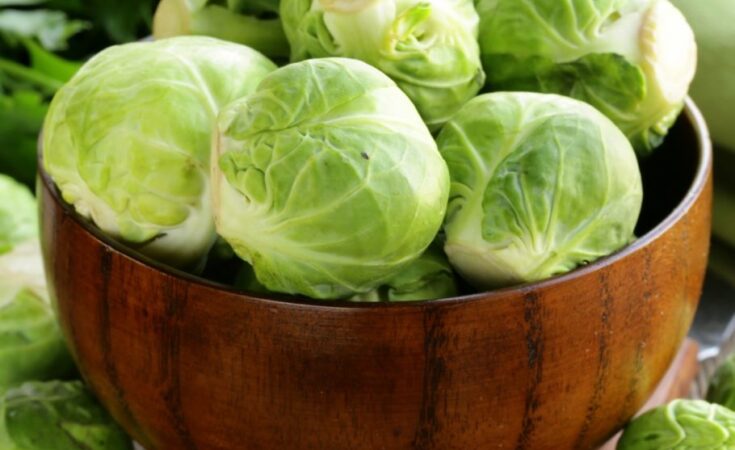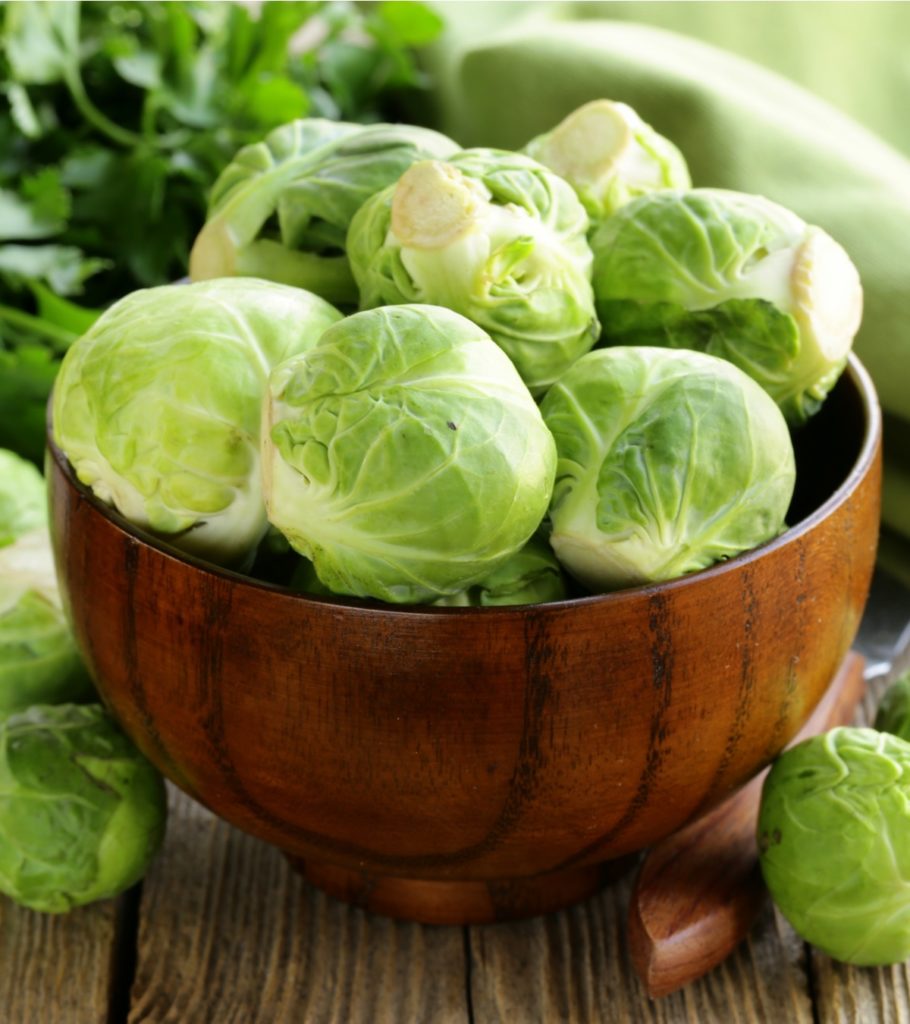Brussels sprouts are small, round, cabbage-like cruciferous vegetables belonging to the cabbage family. One can add raw Brussels sprouts in salads or make tasty dishes by roasting, toasting, or baking them (1).
The vegetable is rich in vital nutrients and phyto chemicals that confer long-term health benefits (2). But since the vegetable has a sharp, bitter taste and is known to cause gas in sensitive individuals, you may wonder if feeding Brussels sprouts is safe for babies?
This post tells you about the right age to add Brussels sprouts to babies’ diet, its potential health benefits, and precautions to observe for its safe ingestion by babies.
When Can Babies Start Eating Brussels Sprouts?
Babies can start eating Brussels sprouts in mash or puree form from six months of age (3). Alternatively, you can serve it in finely chopped, steamed/boiled form to let your baby practice self-feeding. Chopping and cooking the vegetable right is vital to prevent gagging or choking that may occur if the pieces are large and their leaves are whole.
Once the baby adjusts to the taste and digestibility, try serving them sauteed, roasted, baked, and pan-fried Brussels sprouts dishes. Thanks to their refined pincer grasp skills, most babies can eat Brussels sprouts cut into quarters by nine months of age. Babies aged 12 months and older can eat well-cooked, bite-sized pieces of the vegetable. Alternatively, they can consume its raw shreds as salads.
Nutritional Value Of Brussels Sprouts
Brussels sprouts contain significant amounts of vitamin C, K, dietary fiber, and several bioactive compounds, such as polyphenols and flavonoids, that may improve overall health over time (3) (4). Feeding one boiled (without salt) and drained Brussels sprouts (21g) can offer the following nutrients to your baby (5) (6).
| Nutrients | Amount | AI (7-12 months) |
| Fiber, total dietary | 0.546g | – |
| Calcium, Ca | 7.56mg | 260mg |
| Magnesium, Mg | 4.2mg | 75mg |
| Phosphorus, P | 11.8mg | 275mg |
| Potassium, K | 66.6mg | 860mg |
| Sodium, Na | 4.41mg | 370mg |
| Vitamin C, total ascorbic acid | 13mg | 50mg |
| Folate, total | 12.6µg | 80µg |
| Choline, total | 8.53mg | 150mg |
| Vitamin K (phylloquinone) | 29.4µg | 2.5µg |
*AI = Adequate intake – nutrient level assumed to ensure nutritional adequacy
Sources: U.S. Department of Agriculture and Dietary Guidelines for Americans 2020-2025
Possible Health Benefits Of Brussels Sprouts
Brussels sprouts are a low-calorie vegetable that can add color and texture to your baby’s meals. Here are some of the notable benefits that your baby could reap with the regular consumption of Brussels sprouts over time (2).
- Promotes wound healing: Brussels sprouts are rich in vitamin C and vitamin K. These vitamins are necessary for proper wound healing. While vitamin K triggers clotting and prevents excessive blood loss, vitamin C propels collagen production, essential for tissue repair (7) (8).
- Enhances immunity: Vitamin C and numerous phytochemicals, such as polyphenols, flavonoids (kaempferol), sulforaphane, and glucosinolates in Brussels sprouts, can fight free radical damage and reduce inflammation. These effects could help boost immunity in the long run (9) (10).
- Averts digestive issues: A cup (78g) of Brussels sprouts can give four grams of fiber. Fiber is crucial since it adds bulk to the diet and maintains healthy bowel movement, keeping digestive issues, such as constipation, at bay.
- Promotes bone health: Brussels sprouts have considerable amounts of calcium, potassium, protein, and abundant vitamin K. The body needs these nutrients to perform several functions, such as bone mineralization and calcification, which are vital for healthy bones (11).
Tips For Selecting And Storing Brussels Sprouts
Here are the tips that you can follow to store and select Brussels sprouts properly.
Selecting Brussels sprouts
- You can buy Brussels sprouts on the stalk or loose. Irrespective of your choice, look for small-sized Brussels sprouts, which are usually tender and sweeter.
- Pick round Brussels sprouts that have firm, bright green heads with tightly packed leaves. Also, they should feel heavy for their size.
- Avoid Brussels sprouts that have bruised or yellow leaves as they indicate that the Brussels sprouts are aged. Likewise, avoid Brussels sprouts with black spots as they indicate fungal infestation.
Storing Brussels sprouts
- Clean the Brussels sprouts with a damp cloth before storing them. If you had purchased Brussels sprouts on the stalk, first cut the stalk off and then store them.
- Brussels sprouts should be consumed within a day or two after purchasing them. However, if you can’t, refrigerate them in a zip-lock bag and keep them in the crisper drawer.
Even after storing them in a zip-lock bag, try consuming Brussels sprouts fresh as aged Brussels sprouts taste bitter and unpleasant.
Precautions To Take While Feeding Brussels Sprouts To Babies
Below are some safety measures that can ensure the safe ingestion of Brussels sprouts.
- Introduce finely chopped, steamed/boiled Brussels sprouts to babies in small amounts, such as a teaspoon or two. Once the baby adjusts to its digestibility, increase the amount gradually to a tablespoon to two. Also, you can prepare different Brussel sprouts dishes using different cooking methods, such as baking, pan-frying, and roasting.
- Follow a “three to five days wait” rule after introducing Brussels sprouts. During this period, don’t introduce any new food to your baby. Doing so helps rule out any discomfort or allergy that the baby may experience after ingesting Brussels sprouts for the first time.
- Sensitive babies may develop gastrointestinal disturbance after ingesting Brussels sprouts due to fructans (FODMAP) present in them. Discontinue feeding Brussels sprouts for the time being if the baby shows signs of discomfort. Reintroduce later, say after two to three days, and stay watchful (12).
- Consult a pediatrician if discomfort reoccurs or worsens than before. In most cases, discomfort happens when Brussels sprouts are eaten raw.
- Brussels sprout allergy is rare but possible. An individual allergic to Brussels sprouts can develop an allergic reaction after touching or ingesting Brussels sprouts. Some of the common signs of the allergy are abdominal discomfort, itchy skin rashes (hives), wheezing, coughing, and vomiting (13).
- Brussels sprouts can have cross-reactivity with peach, turnip, mustard, and cabbage. Thus, if your baby is allergic to any of these foods, consult your healthcare provider before feeding Brussels sprouts.
- Drug interaction with Brussels sprouts is possible. Brussels sprouts may react with the compounds of some medications, such as anticoagulants. Consult a doctor to learn if it is safe to feed Brussels sprouts to your baby, who is on medication.
Flavorful Brussels Sprouts Recipes For Babies And Toddlers
Here are some easy-to-make, baby-friendly Brussels sprouts recipes that you can feed to your baby and toddler.
1. Brussels sprouts puree (6 months)
You will need:
- 100 g Brussels sprouts (cut into halves/quarters)
- Pinch of black pepper
How to make:
- Put the Brussels sprouts in a steamer and steam cook over medium heat for about ten to 15 minutes, until they turn very tender.
- Once done, transfer the piece into a bowl and blend them into a smooth puree using a hand blender.
- To adjust the puree’s consistency, add three to four teaspoons of boiled water or some breast milk.
- Feed it to the baby immediately or freeze the puree into an ice tray for later use.
2. Brussels sprouts soup (6+ months)
You will need:
- 1 cup Brussels sprouts (chopped)
- 2 cups homemade vegetable stock
- ½ onion (finely chopped)
- 1 garlic clove (minced)
- 1 tsp olive oil
- ⅛ tsp dried herbs mix (without salt)
How to make:
- Heat olive oil in a pan over medium heat. As the oil warms, add chopped onion and fry them for two to three minutes until they soften.
- Now, add minced garlic and Brussels sprouts and sauté for two to three minutes.
- Add vegetable stock until the Brussels sprouts pieces are immersed. Cover the pan with a lid and bring the mixture to a boil. Then, reduce the heat and simmer the mixture for five to six minutes, stirring occasionally.
- Once done, switch off the flame and set the pan aside for ten minutes to cool.
- After ten minutes, blend the mixture into a smooth, lump-free soup using a hand blender or food processor.
- Transfer the soup into a soup bowl and feed it to your baby.
3. Brussels sprouts chips (8+ months)
You will need:
- 1 cup Brussels sprouts (leaves separated)
- 2 tbsp olive oil
- ½ tsp dried herbs mix (without salt)
How to make:
- Preheat the oven to 350°F (176°C).
- Meanwhile, put Brussels sprouts leaves in a bowl and coat them with olive oil.
- Place the leaves face down on a baking sheet in a single layer and put the tray in the oven.
- Bake the leaves for 12 to 15 minutes until the leaves turn light brown and crisp.
- Once done, transfer the baked leaves to a plate, season them with dried herbs mix, and serve to your baby.
4. Roasted Brussels sprouts spaghetti (10+ months)
You will need:
- 1 cup Brussels sprouts (thinly sliced)
- 2 cups spaghetti (cooked)
- ¼ cup Parmesan (grated)
- 2 tbsp olive oil
- 1 tsp dried herbs mix (without salt)
- 2 garlic cloves (thinly sliced)
- Pinch of black pepper powder
How to make:
- Heat olive oil in a skillet over low heat. As the oil begins heating, add sprouts pieces and cook for about five to seven minutes, occasionally tossing, until they turn brown and tender.
- Add garlic and cook over low flame, occasionally stirring, until the garlic turns brown.
- Then, add spaghetti, dried herbs mix, and cheese. Mix well until everything looks well combined.
- Once done, turn off the flame and transfer the spaghetti to a plate. Season with a pinch of black pepper powder. Serve immediately to your baby and let them relish the delectable dish.
5. Steamed Brussels sprouts with bacon (12+ months)
You will need:
-
- ¼ cup uncured Bacon
- ½ cup Brussels Sprouts (quartered and steamed)
How to make:
- Put a skillet over medium heat and place bacon strips on it. Cook the strip until they turn crispy.
- Once done, transfer the strips to a plate and set them aside to cool. Once the strips come to room temperature, cut them into small pieces.
- Add the cooked Brussels sprouts to the same skillet and pan-fry them for two to three minutes. Add chopped bacon pieces and toss the mixture two to three times on medium heat.
- Transfer the dish to a serving bowl and serve it to your toddler. Let them relish crispy bacon and Brussels sprouts.
Brussels sprouts are a nutritious vegetable that babies can begin eating from six months of age. However, to ensure your baby reaps its benefits to the fullest, feed Brussels sprouts in age-appropriate ways. Serve well-cooked Brussels sprouts in mash, puree, or shreds forms to young babies. Then, as they grow, introduce them to Brussels sprouts’ unique flavor by cooking this healthy vegetable through different methods, such as roasting and baking.
References:
MomJunction’s articles are written after analyzing the research works of expert authors and institutions. Our references consist of resources established by authorities in their respective fields. You can learn more about the authenticity of the information we present in our editorial policy.



































